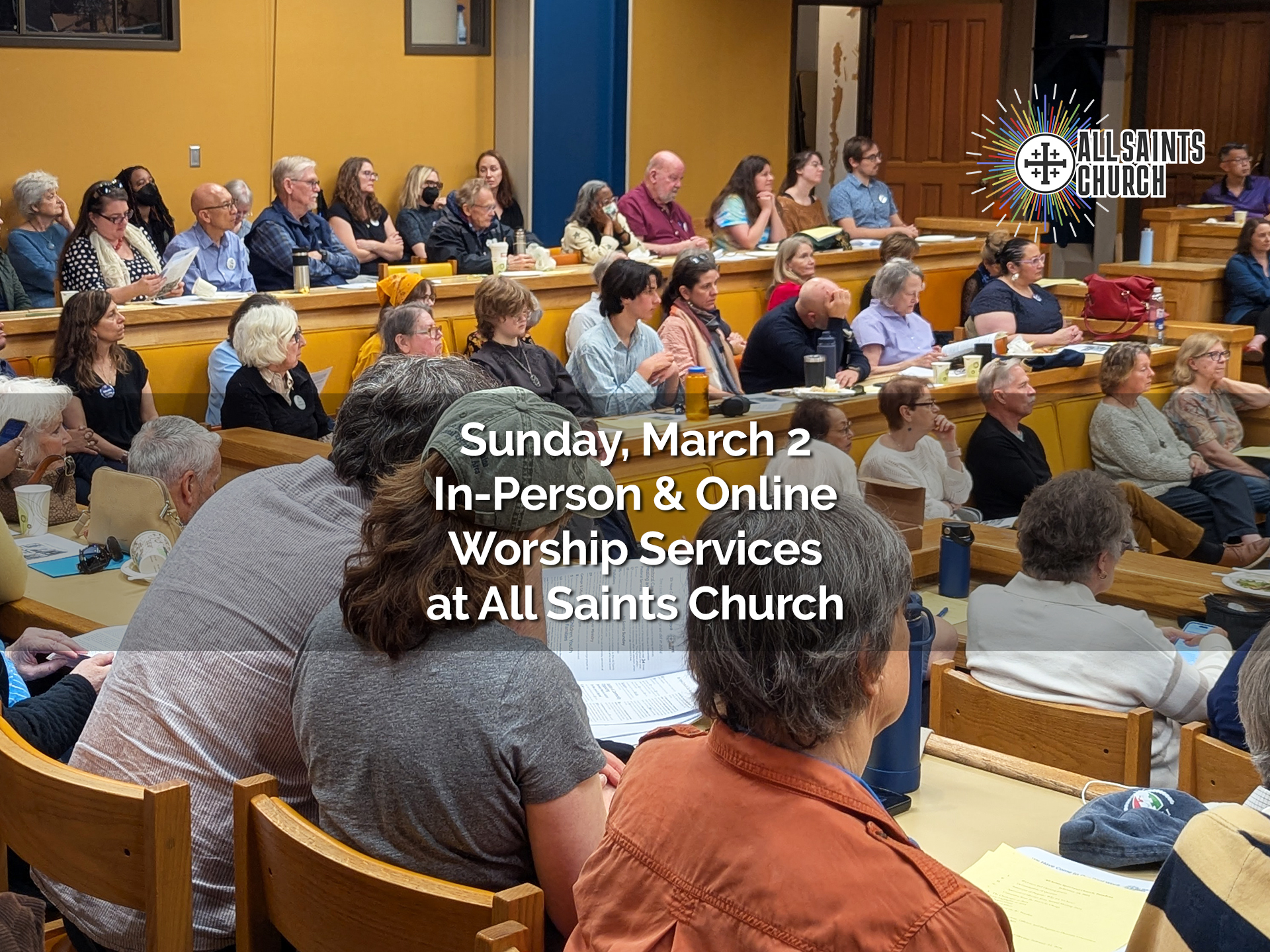On Saturday, November 18th All Saints Church hosted “One Earth, One Sky: Facing the Climate Crisis” — an event organized by the ASC Climate Change Task Force to further the implementation of the Climate Change Resolution adopted by our Vestry in June 2016. The event opened with these remarks by All Saints Rector Mike Kinman.
At All Saints, we consider ourselves a “peace and justice” church. The problem with that is it’s redundant. It’s redundant in the same way that calling someone a living, breathing, human being is redundant. Peace and justice are necessary strivings of any community that would call itself followers of Jesus, so I prefer to consider All Saints just “the church.”
And – I do think those terms are worth examining for a few moments. And I want to take them in the proper order, for as the prophets on the streets say, “no justice, no peace.”
The word justice in the Hebrew scriptures is mishpat, and it appears more than 200 times – and the root of it is equity. And it is particularly concerned with those who find themselves on the downside of inequity. Those whose experience of that short side of justice has been, in the words of Becca Stevens, “the underside of bridges, the back side of anger, and the inside of prison walls.”
Here at All Saints Church we have, in recent years, passed three resolutions about justice, about mishpat. One of economic justice, one on racial justice and the one that gathers us today, on climate justice.
These three resolutions are connected because the issues of economy, race and the destruction of our planet are inextricably intertwined. First, the Venn Diagram of the most deeply affected people in these three areas contains many of the same people – and they are all those with whom scripture particularly is concerned in its discussion of mishpat, and that is the most vulnerable. People of color are those most deeply adversely affected by our economic system and people and nations in poverty – who are largely people of color—are the most adversely affected by climate change. White supremacy – a system whose very goal is inequity and thus is a destroyer of mishpat – is a causal factor in all three injustices.
And there is a second connection, and here is where we make the transition from justice to peace. From mishpat to shalom. The second connection is our idolatry of economic growth and of wealth creation as our organizing principle. Functionally, our nation – and, truly, the world — is Pharaoh’s Egypt, where creation of wealth is more important than quality of life and human beings are not seen as sacred images of God but as means of production.
As we gather today to recommit ourselves to mishpat for our planet, I am naturally drawn to my memories of growing up in Arizona listening to the Spirit words of the Tohono O’Odham, the Yaqui and the Navajo who sang in their own words the song of Ecclesiastes – that “to every thing there is a season and a time to every purpose under heaven.” That yes there are spring and summer, times for birth and growth, and a time for harvest in the fall and then a season for rest and regeneration in the winter.
But we don’t do that. When my ancestors arrived on this land, regardless of what we called ourselves, we did not come as pilgrims to learn from the wisdom of the native residents of this land, we came as genocidal conquerors, not only killing and imprisoning those images of God we found but building an entire society and economy on a counter narrative of eternal spring and eternal harvest. And because that is absolutely impossible to establish and sustain with a society of mishpat where human labor is valued equitably and human beings are seen as holy, we decided mishpat was disposable.
And we kidnapped millions of black bodies – we did not see them as people – and dragged them across the sea, and on the backs of those who survived we set a standard for production based on the labor tortured out of people given no income. And when that source of unpaid labor was “emancipated,” we did not adjust our standard of production or consumption but instead found new ways – contract labor and convict leasing, Jim Crow and mass incarceration and mass criminalization of people of color – new ways to maintain and even expand it.
The version of capitalism based on limitless production and consumption, a system that we have made normative for the entire planet – is not only unjust it is based on an absolute lie of what is possible given the human and other natural resources we have. It is only sustainable through enslaving and torturing human beings and the planet herself, and torture is leading where it always leads – rapidly unto death.
As the church, we have to name this. And for we at All Saints who love to claim the prophet’s mantle, this is the definition of taking a prophetic stand. A prophetic stand is pointing out where we as a nation have drifted away from the dreams of God and into idolatry and it is always taken at great personal risk. The shoe fits. We have built multiple golden calves and it is killing our soul and killing our people and killing our planet to continue to feed them and yet it is the one thing we are not allowed to speak about.
Speaking against economic growth is our equivalent of blaspheming against the Holy Spirit – the only unforgiveable sin. Have you ever heard a politician do it? Have you ever heard a politician speak against economic growth? And yet unrestrained production and consumption is not only killing our planet, it is enslaving us all individually, trying us to ridiculous work schedules and multiple jobs to make ends meet, removing the possibility of prayer, study and reflection from our lives, and giving us less and less time, energy and resources to spend together.
And that is where shalom comes in. Shalom is the Biblical concept of peace. Shalom is not just peace as the absence of conflict, it is a quality of relationship that is deep in its mutuality, that is characterized by grace and mercy, by relationships of deep equity. One of the fuels of shalom is the idea of Sabbath, that rest and regeneration and refocusing on God and the family and the gathered community is not an option but a necessity that when removed leads to death. That you cannot have spring, summer and fall without winter.
We are gathered here this morning to recommit ourselves to saving our planet from the ecological cataclysm that is already too far underway. But if we do this by adding 10 or 100 more things to our already overflowing to-do lists, not only are we setting ourselves up to fail, we are actually reinforcing the same death-producing system that got us here and that will kill us all if we don’t stop.
The answer is not doing more but changing how we live. The answer is becoming a community of shalom, what Howard Thurman, Dr. King and so many others have called “the beloved community.” A community where the fundamental value of a human being is their very being and not how much they can produce. Reclaiming Sabbath. Embracing corporeal acts of mercy – feeding those among us who are hungry, visiting the sick and those in prison – acts that are about slowing down and spending time in relationship as a way of rehumanizing our views of one another and living what the great Ruby Sales calls a “doctrine of human indispensability.” Realizing that God is calling us to what might be the most prophetic act of this or any era, which is to produce less and do less and love more.
The road to shalom is not adding 50 more things to our to-do lists, however it might involve taking some things off them – and more particularly helping those among us who are most vulnerable take things off of theirs.
The road to shalom is about how we live together. It is about establishing new metrics for success that are not attendance or sales or product but depth of compassion and time spent together, cups of water given to children, prisons demolished and debts forgiven.
The road to shalom is one we cannot travel alone but by its very definition must be traveled together. And there is no greater sherpa for this journey I can think of than our keynote speaker this morning. For nine years as Presiding Bishop of the Episcopal Church, Katharine Jefferts Schori was resolute in her preaching about the shalom of God. She has worked tirelessly her entire life to bring shalom through establishing mishpat, be it in her work as a biologist and oceanographer or her leadership as Presiding Bishop on eliminating poverty domestically and globally and advocating fiercely for changed behaviors to save the Earth, putting the Gospel in the context of both our most vulnerable people and the planet herself who together are crying out “I can’t breathe.”
Currently, Katharine is serving as the interim bishop of the Episcopal Diocese of San Diego and it is an honor and joy to have her here today. Will you please join me in welcoming Bishop Katharine Jeffers Schori.



